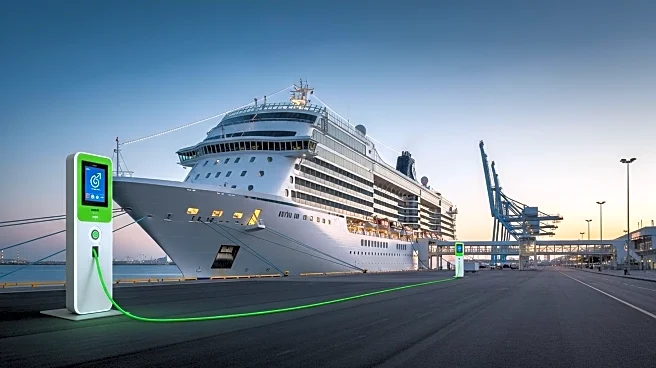What's Happening?
The Cruise Lines International Association (CLIA) has released its 2025 Environmental Technologies and Practices Report, highlighting significant strides in sustainability within the cruise industry. CLIA's 45 member companies are investing heavily in technologies aimed at achieving net zero emissions by 2050. These include advanced wastewater treatment systems, low-emission fuels, and shore-based power solutions. The report notes that 166 ships, representing 58% of the fleet, are now equipped with Onshore Power Supply (OPS), allowing them to reduce emissions by up to 98% while docked. Despite this progress, only 41 ports globally offer OPS, though the EU's Fit for 55 mandate is expected to accelerate adoption by requiring major European ports to provide OPS by 2030.
Why It's Important?
The cruise industry's move towards sustainability is crucial for reducing its environmental impact, particularly in terms of emissions and waste management. By adopting OPS and other technologies, the industry can significantly lower its carbon footprint, aligning with global efforts to combat climate change. This shift not only benefits the environment but also enhances the industry's reputation and compliance with international regulations. As more ports adopt OPS, the infrastructure will support broader maritime decarbonization efforts, potentially influencing other sectors within the shipping industry.
What's Next?
The EU's Fit for 55 mandate will likely drive further adoption of OPS, with 19 ports already receiving funding and 26 more in planning stages. This regulatory push will encourage more cruise lines to retrofit existing ships and design new builds with OPS capabilities. Additionally, the industry is expected to continue investing in alternative fuels and waste management technologies, further advancing its sustainability goals. Stakeholders, including environmental groups and regulatory bodies, will likely monitor these developments closely, advocating for continued progress and accountability.
Beyond the Headlines
The cruise industry's sustainability efforts may have broader implications for maritime policy and environmental standards. As the industry adopts more sustainable practices, it could set a precedent for other sectors, encouraging similar advancements in cargo shipping and port operations. This shift may also influence consumer expectations, with passengers increasingly prioritizing eco-friendly travel options. The industry's commitment to sustainability could foster innovation and collaboration across the maritime sector, driving long-term environmental and economic benefits.










